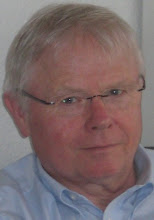 An author is only then dead for a real faithful reader when he has finished reading the last page of the latest published book. So for me the 25th of July 2009 is John Updike's date of death, not January 29th, the actual day.
An author is only then dead for a real faithful reader when he has finished reading the last page of the latest published book. So for me the 25th of July 2009 is John Updike's date of death, not January 29th, the actual day.
There were still two new books to follow after John Updike had passed away. In March his poems Endpoint came out. In June My Father's Tears followed, a book with 18 short stories, whose last one The Full Glass I finished reading today, not without being rather touched.
Other than the poems whose final ones were written under the knowledge of the deadly threat that lung cancer posed to Updike's life, the short stories contain no hint that death is close at hand. Until the end the main character of every story (always clearly Updike himself, although disguised in different names and professions) talks rarely about old age and if, looks upon it with a humorous optimism, just as if life could go on for many more years.
In the last story Updike surprises the reader by choosing a rather practical profession for the narrator. He characterizes himself: My employment for 30 years, refinishing wood floors - and already the end of the long introducing sentence makes it clear, what to expect: […] has conditioned me against digging to deep. He is a craftsman, not an intellectual.
One can, of course, expect that this humbleness is a tricky way to get to other goals that Updike is pursuing. To my impression there has always been this particular one: to show his scepticism against all professional digging into people's souls. Not unlike his highly estimated model as an author, Vladimir Nabokov, who hated any kind of psychology, also Updike's art obviously grows from the knowledge that the human Psyche is too deep or at least too contradictory to be logic, an object of science.
When the craftsman at one stage of the narration does nevertheless dig something deep out of his soul (the secret relief that one of his former mistresses is dead and cannot go on to disturb his life from a distance) the idea is immediately withdrawn. There. You see why I am not given to introspection, to digging deep. Scratch the surface, and ugliness pops up.
So Updike consequentially keeps picturing rather mundane things that seemingly form a gentle stream on the surface, with little meaning. The truth, of course, is that there are many ways from here to reach deep into the secrets of human existence, and Updike knows all these ways.
The final scene describes the ritual of an average morning, shaving, taking pills and all. The glass of water that gives the story its title is raised to bring out an odd kind of toast. Updike here ironically pretends that he is not sure about what is in the drinkers soul. And so, half knowing and half not knowing, he ends his last story, his last book on earth:
If I can read the strange old guy’s mind aright, he is drinking a toast to the visible world, his impending disappearance from it be damned.
We will miss John Updike greatly.




